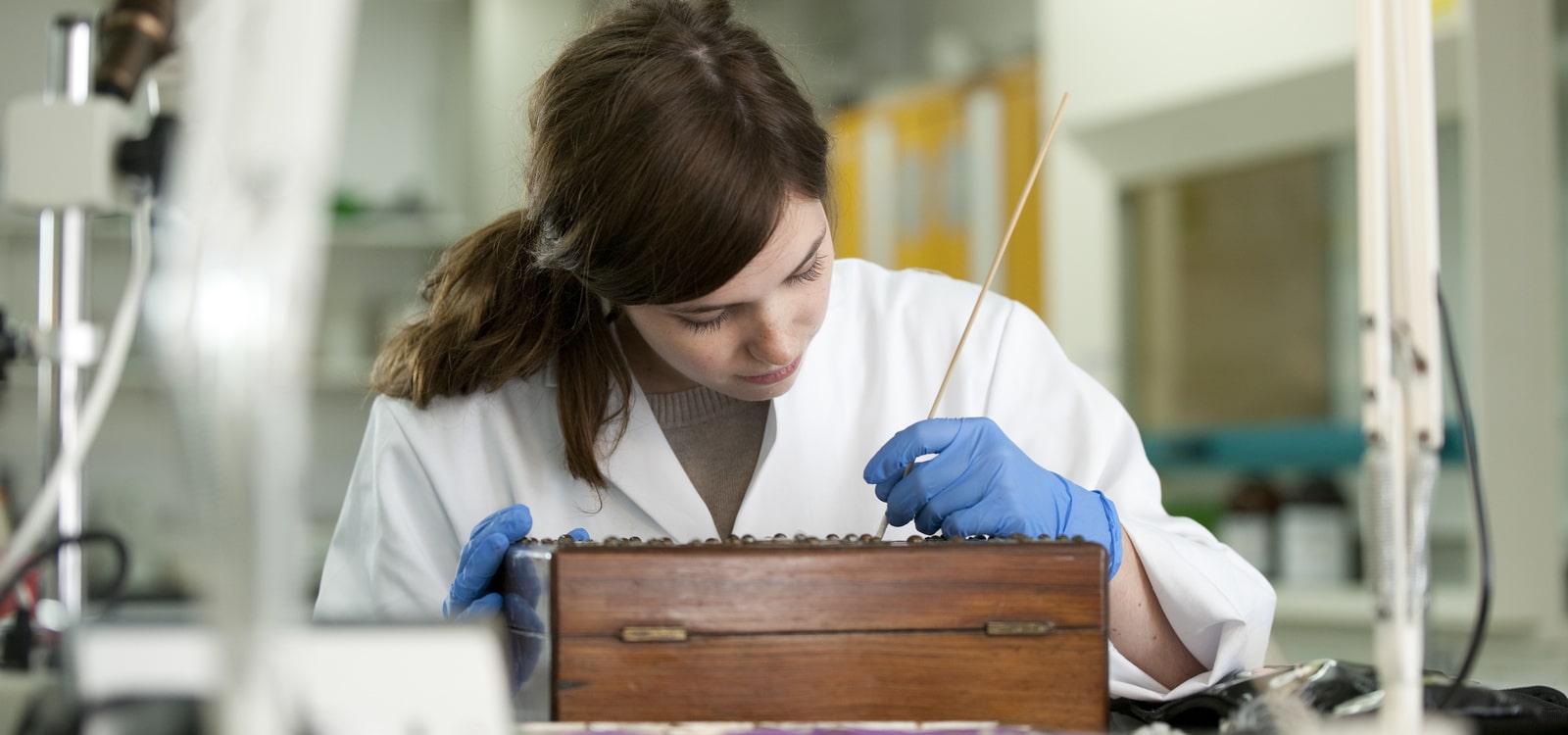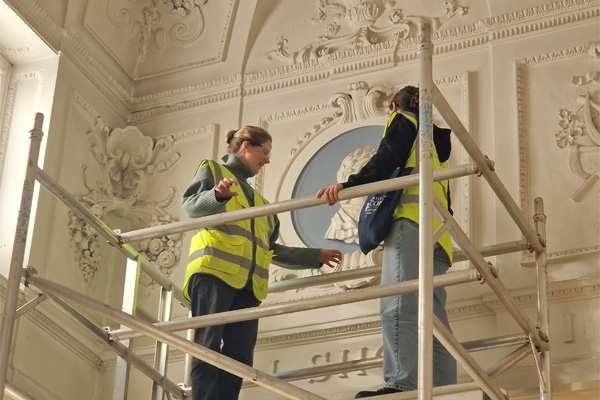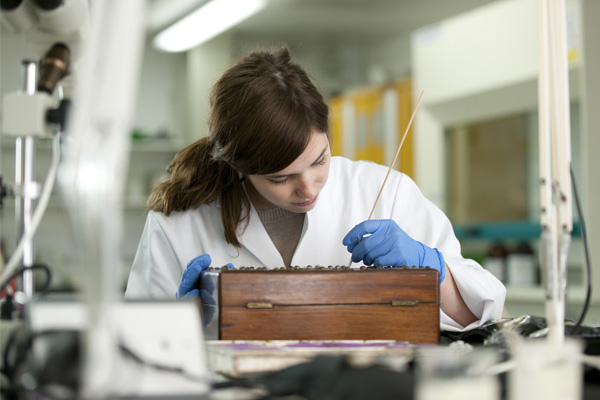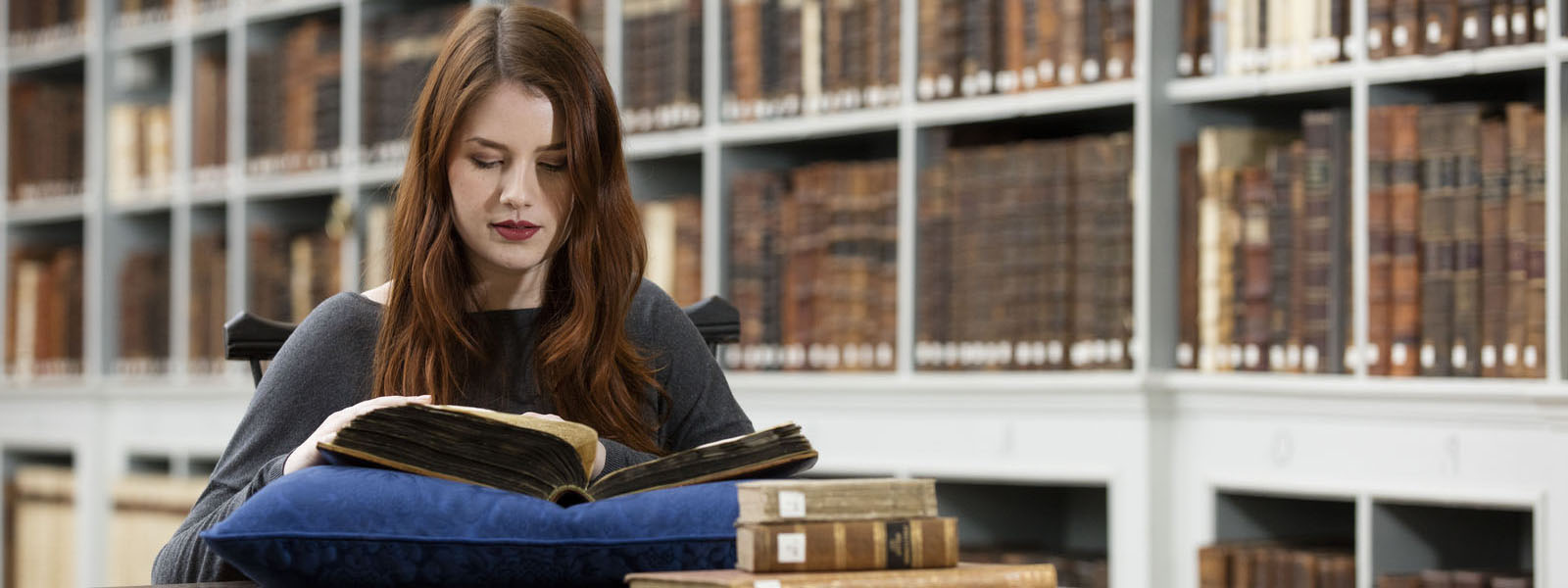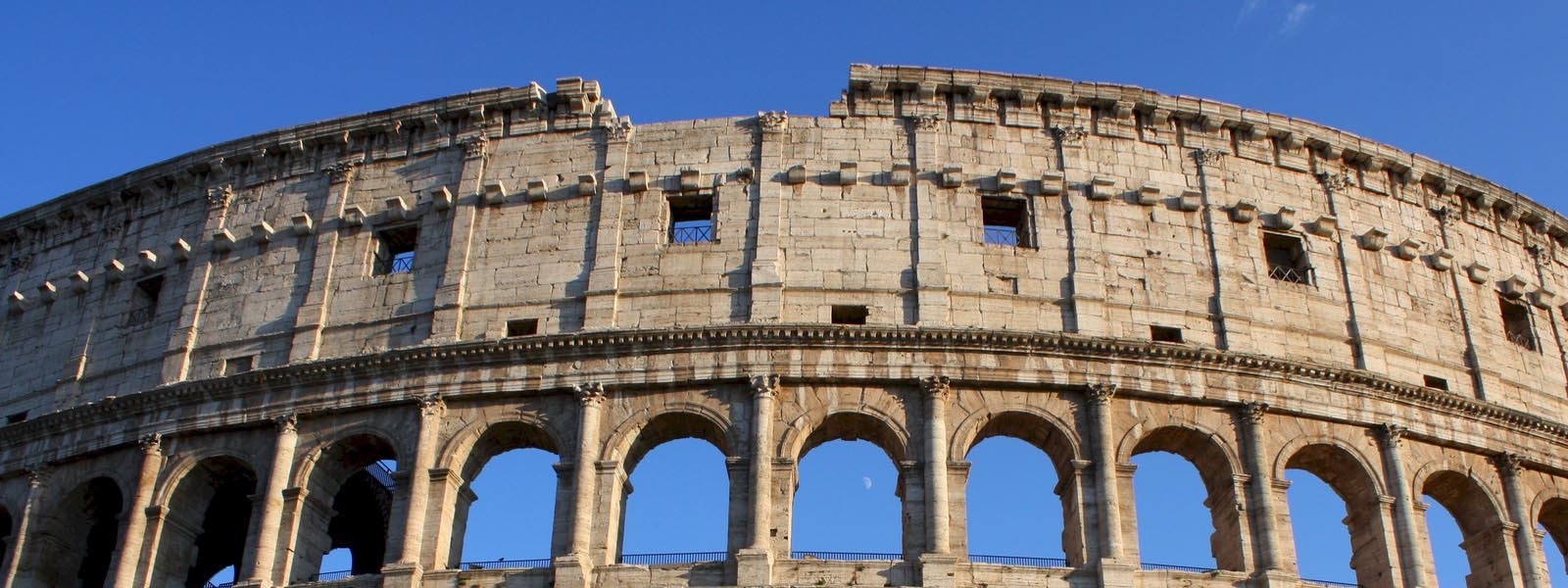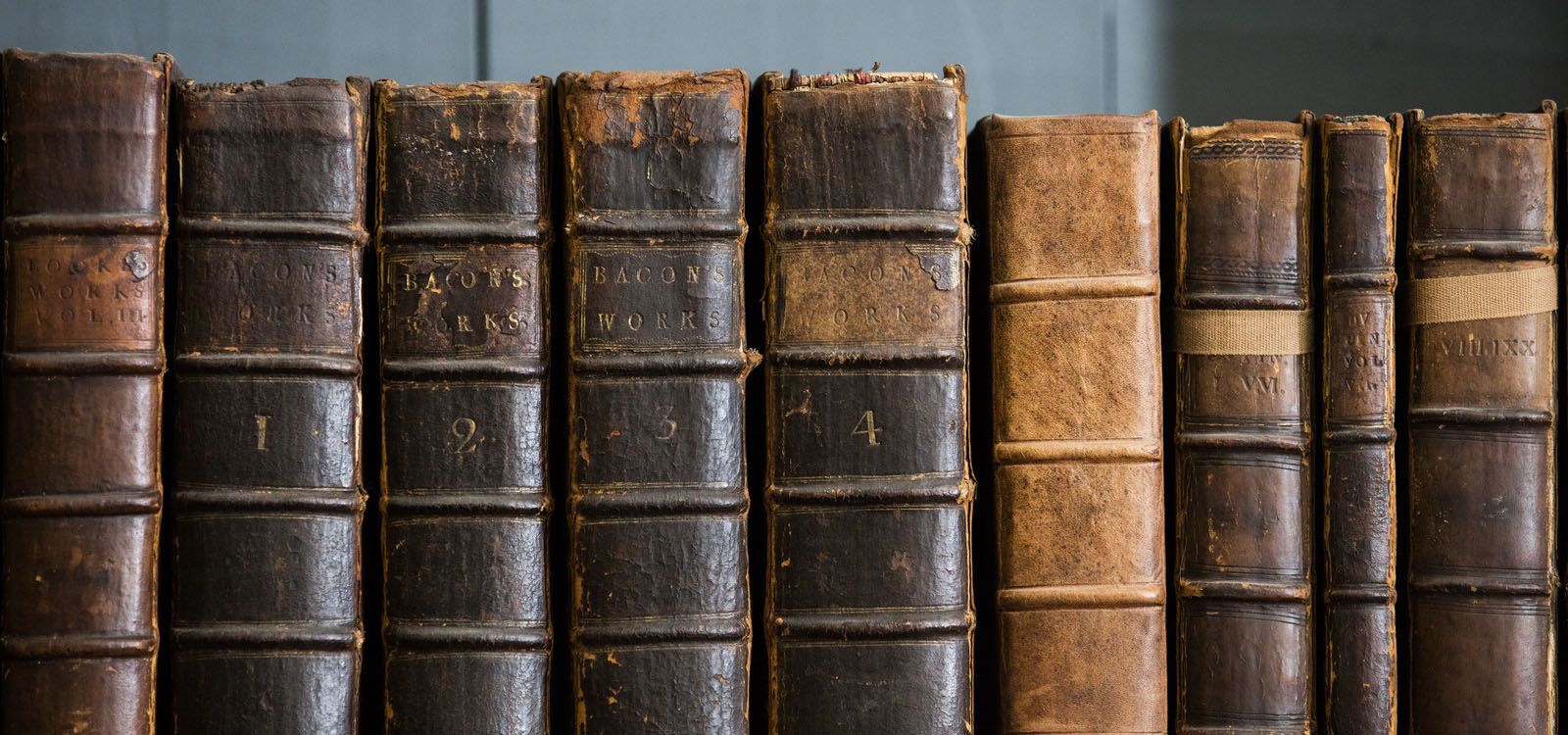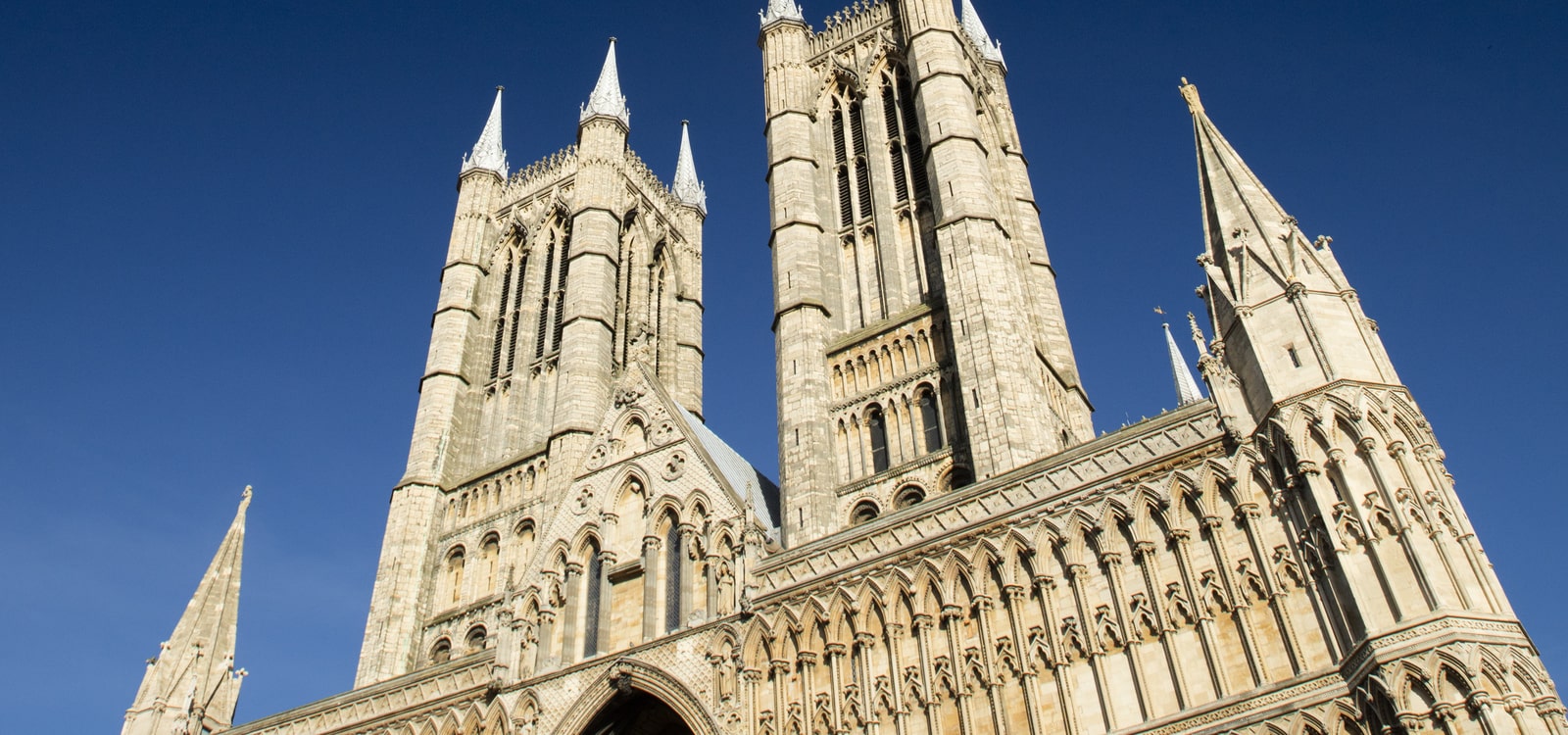Module Overview
This module aims to develop the basic skills introduced in year one and apply them to the conservation of objects related to a range of material types. Theoretical concepts introduced in Year 1 can be developed and underpin students’ practice.
The module offers the chance to develop important transferable skills for understanding of the behaviour of materials and manual dexterity. It also looks to reinforce and develop students' skills in conservation report-writing.
Module Overview
This module aims to further develop knowledge of materials science and its relevance to conservation. Students have the chance to develop skills in the use of scientific analytical techniques for the examination and identification of materials encountered in historic objects and their treatment.
Module Overview
This module looks to provide an introduction to the preventive conservation skills needed to set out as a practicing conservator. Students have the chance to develop an understanding of practical preventive conservation and collections management procedures, and can gain experience in environmental monitoring and surveying. Topics such as integrated pest management and emergency planning are also discussed.
Module Overview
This module provides students with the opportunity to resurrect and understand the ordinary lives of people like themselves and their forebears from the sources available to us. The course picks up on both well-established and recent trends in historical research that have sought to give voice to ordinary people and promote from the historical records the lives of marginalised people such as homosexuals, women, children, the working classes, ethnic minorities alongside more familiar narratives of the great and the good.
Module Overview
This module introduces students to philosophical questions about the nature of art and beauty. For example: What is art? Can anything be a work of art? Can a pile of elephant dung be art? Is beauty objectively real or only ‘in the eye of the beholder’? Can aesthetic judgements be right or wrong? Is Beethoven better than Beyoncé? Is Shakespeare better than Eastenders? Or are aesthetic disputes like deciding between the merits of different flavours of ice cream?
Students can also consider questions that arise in relation to specific artforms: How is it possible to respond emotionally towards the plight of fictional characters that are known not to exist? Do rock/pop music and classical music require different aesthetic criteria for their appreciation and evaluation? Why do we take pleasure in the aesthetic representation of tragic events? Students will be guided through their reading of various classical and contemporary works on such issues, and encouraged to think for themselves about the problems addressed.
Module Overview
This module provides a survey of the history and archaeology of the eastern Mediterranean and the Middle East between the reign of Alexander the Great and the death of Cleopatra VII after the Roman victory at the Battle of Actium in 30 BC. Students will have the opportunity to explore the political histories, power structures, cultural developments, economic processes and shifting ideologies associated with the major Hellenistic kingdoms and ending with the Roman conquest of the eastern Mediterranean region. Teaching also considers how the Hellenistic period was a time of innovation, cultural connectivity, even globalisation, laying the foundations of a Hellenized world of city-states which endured into and defined the Roman construction of a world empire in its aftermath.
Module Overview
Renaissance monarchs often employed artistic display to project royal authority. Ruling elites commissioned pieces of art not only for the embellishment of their residences, but also as a suitable vehicle to display authority. Kings and Queens commissioned tapestries, sculptures, royal palaces, or lavishly decorated printed books that narrated their achievements and omitted their failures. This module examines the diverse ways rulers and their entourage imagined and created an image of kingship through the visual arts.
Module Overview
This module examines how and why the culture of Britain changed in the period of increasing contact with, and eventual incorporation into, the Roman Empire. Examining the key material, behavioural, ideological and structural changes to society in the period c. 100 BC to AD 450, it will question to what degree each aspect was a wholesale incorporation of ‘foreign’ ideas, technologies and goods, a local interpretation and adoption of these importations into an existing social system, or a local creation that was distinctly Romano-British, if often termed ‘Roman’.
Module Overview
Students can gain an introduction to the historical and archaeological sources, approaches and methods necessary for the study of the ancient world. Lectures provide a survey of key moments in history, 1000 BC-AD 400, structured around the research specialisms of the module teaching team.
Module Overview
This module gives students the opportunity to read one text (in translation) closely and discuss sections each week with a tutor. It offers the opportunity to develop skills in textual analysis, including researching an author; assessing the intended audience; and considering the social/political context, the significance of genre and style, and other factors in how we interpret and understand a text. Students also compare and critique research that has used the text and explore the possibilities it has to serve as primary evidence for the study of the ancient world.
Module Overview
This module focuses around a 12 week period of placement in a museum, historic house or private workshop. Students are responsible for negotiating the placement arrangement with support and guidance from their placement tutor. Students are encouraged to select a placement to suit their individual aspirations and needs. This concludes with a presentation, which is designed to allow all group members to benefit from the experience of their peers.
Module Overview
This module focuses around a 12 week part time placement in a museum, historic house or private workshop. Students are responsible for negotiating the placement arrangement with support and guidance from their placement tutor. Students are encouraged to select a placement to suit their individual aspirations and needs. This concludes with preparation of a portfolio, and a presentation, which is designed to allow all group members to benefit from the experience of their peers.
Module Overview
Beginning with the Royal Historical Society’s “Race, Ethnicity and Equality Report” (published in 2018), which raises urgent questions on the diversity of staff, students and curricula at History departments in UK universities, the module analyses live debates on “Decolonising the Curriculum” in higher education. We critique how histories of Empire, colonialism and slavery have been taught in Anglo-American settings, and introduce postcolonial analysis on archives, as well as the “Global South” and “indigenous knowledge” that have often been marginalised in Eurocentric historiographies.
Turning towards the University as a key apparatus of power in the contemporary world, the module then reveals the complex legacies of slavery in the making of a number of UK and US institutions including Liverpool, Bristol, Oxford (#RhodesMustFall), SOAS, University of Virginia and others. Introducing the new field of “Critical University Studies” (CUS), students will learn about the emergence of universities in former colonies including India and South Africa, as well as the phenomenon of “transnational education” that entails the establishment, by prestigious European and American institutions, of satellite campuses around the world. The module then unpacks public understandings of colonial history via recent scholarship on nationalism, patriotism, museums and memories, and ends with a hopeful reflection on pedagogies that will be more inclusive and intersectional in terms of race, class, gender, and sexual orientation. This module will be particularly suited to students who intend to develop careers in education.
Module Overview
The cultural heritage sector increasingly offers opportunities for the application of digital technologies as communication, research and recording tools. This module enables students to become familiar with some of these advanced recording techniques for the study and recording of objects.
Module Overview
The module looks at a number of ways in which historians have studied the family in Britain between c.1500 and 1800. It will examine a range of historical approaches from the demographic to the more qualitative and anthropological. Close attention is paid to the problems historians of the pre-industrial family confront in their examination of the surviving primary sources.
Module Overview
The aim of this module is to give students a thorough understanding of two intimately related philosophical traditions that came to prominence in the 19th and 20th centuries: existentialism and phenomenology. Each attempts to address the nature and meaning of human existence from the perspective of individual, first-person experience, focusing in particular on fundamental questions of being, meaning, death, nihilism, freedom, responsibility, value, human relations, and religious faith.
The module will examine selected existential themes through the writings of thinkers such as Kierkegaard, Nietzsche, Heidegger, Sartre, De Beauvoir, and Camus. Since existentialism is as much a artistic phenomenon as a philosophical one, students will also be given the opportunity to explore existentialist ideas in the works of various literary figures, such as Shakespeare, Dostoyevsky, Kafka, and Milan Kundera.
Module Overview
The civil wars that raged across England, Wales, Scotland and Ireland in the mid-seventeenth century were among the most turbulent and exhilarating times in British history. This module explores the diverse ways in which the wars were explained, experienced and remembered by those who lived through them. Students can consider the extent to which this period, often described as one of 'revolution', left a lasting impression on British society, culture, religion and politics.
Module Overview
The modern period has often been understood as a time when peace was considered the natural state of societies, where states and non-governmental groups have been concerned with achieving a lasting peace and avoiding repetitions of bloody conflict. Wars, however, have not become a thing of the past, and today we live in a condition of seemingly permanent war where civilians are often the primary targets. This module will look at how ideas and practices of war have altered in the last few hundred years, and how these notions have been contested and challenged. The module asks where these ideas came from, and how concepts of war and peace, and violence and non-violence have been reframed in various ways. The course is focussed on the nineteenth and twentieth centuries and moves chronologically from the Napoleonic wars, to contemporary conflicts through a series of case studies that cover wars, diplomacy, the aftermath of wars, and peace movements. Each case study will draw on key themes which run throughout the module, including pacifism, militarism, imperialism, culture, race, gender and nationalism.
Module Overview
This module will interrogate aspects of the history of gender and sexuality in Britain over a 250-year span, coinciding with the arrival of ‘modernity’. It will introduce students to debates over the relationship between gender, sexuality, and structural changes in society, economy and politics, as well as thinking about gender and sexuality as discourse and subjectivity. Further, it will introduce students to a wide range of source material for the social and cultural history of early modern and modern Britain and seek to develop their confidence in using such diverse sources skillfully.
The module takes a thematic approach, although within each theme, specific chronological examples will be examined. Thus continuity and change can be highlighted, and it is intended to resist a narrative of progress towards ‘modern’ liberal views of gender and sexuality. However, a clear chronological framework will also be developed through examples which will help students gain a clear understanding of context.
Module Overview
The University has a strong commitment to providing academic programmes with high vocational relevance, which is maintained through working links with local, national and international organisations and, in particular, through student work placements.
The Placement Year aims to give students a continuous experience of full-time work within an organisation. It should be a three-way co-operative activity between employer, student and University from which all parties benefit. It is more than simply obtaining work during a gap in study – work placements should enable students to experience at first hand the daily workings of an organisation while setting that experience in the broader context of their studies.
The Placement Year constitutes a work placement during an academic year, funded by full-time paid employment* taking place between Level 2 and Level 3. The minimum duration of placement is 39 weeks.
Students wishing to undertake the work placement year must successfully complete the Level 2 of their programme.
All students on the Placement Year as part of their full-time undergraduate study will remain enrolled with the University during the period of placement and receive support. Students originally enrolled on 3-year programmes wishing to transfer to the 4-year programme must do so before the start of their placement, should gain the consent of their funders, where appropriate, and advise the University of their intention before the September enrolment.
Module Overview
Italy is a highly-politicised and ideologically-divided country. Divisions and internal conflicts, which have reached dramatic peaks, are a permanent feature in Italian history. They mirror unsolved social and political contradictions that many historians consider to be the result of the process of the Italian Risorgimento. National unification was prompted by republicans, but it was the Monarchy that achieved it.
Module Overview
Works of fiction are not just a source of entertainment. They are a crucial and exciting route into understanding the past. Novels, short stories and poems allow us to understand how debates and ideas about society and identity circulated and how writers attempted to reinforce or change the way that readers looked at the world. This module will examine how a wide range of fiction produced in Britain in the nineteenth and twentieth centuries addressed the key themes of Class, Politics, Gender, Sexuality, Race and Conflict. Students will have the opportunity to examine the treatment of these concepts in genres as varied as crime fiction, popular romance, children’s literature, science fiction, war writing and feminist fiction.
Module Overview
How did people live and die in the middle ages? Drawing on the research expertise of the medievalists in the School, the module seeks to answer this question by addressing key themes relating to the life cycles of medieval people, from their childhood and education, via the roles that they took on in life (within families and in public; peaceful and violent), to their deaths. We will address primary sources that provide intimate insights into the everyday lives of medieval people: letters and autobiographies. Such sources will be contrasted with those that offer a more 'top-down' vision of how medieval society should function, such as rulebooks and conduct manuals. Finally, we will explore how people in the medieval period managed their material and spiritual interests through transactions recorded in documents such as charters and wills. A key aim of the module is to develop your research and writing skills by providing you with an opportunity to produce an extended piece of research. This, coupled with the intensive work with primary sources, will equip you to tackle a final year independent study in a wide range of medieval topics.
Module Overview
This module will give students a unique opportunity to develop their practical skills for studying objects while developing their understanding of the relationship between history and material culture. Students can explore how object-based study can enhance their practice as conservators and historians and how material culture studies can lead to insights that cannot be reached through other approaches.
Module Overview
This module explores the history of media controversy and ‘moral panic’ during the twentieth century. It is designed to introduce students to media texts (especially films and television programmes) that have sparked debate and extreme differences of opinion among audiences in Britain and America. Students will be expected to engage with a range of films, television programmes and primary source material.
Module Overview
This module will examine art in Britain from 1933 onwards in relation to migration. Beginning with the mass exile of artists, photographers, and designers from Nazi-occupied Europe in 1933, it will investigate how art and visual culture in Britain spanning the past ninety years has been shaped by migrants and refugees, and their descendants. We will look at the generation of artists who came to Britain from Africa, Asia, and the Caribbean in the 1950s and 1960s; the British Black arts movement of the 1980s; identity politics and art institutions in the 1990s; second-generation Jewish artists and Holocaust memory, as well as new generations of younger artists exploring heritage today. The module will examine how artists have dealt with experiences of migration and the associated experiences of displacement, dislocation, loss, and ‘otherness’, and in relation to constructions of class, gender and race. As well as focusing on the reception and changing status of émigrés in Britain, it will consider iconographies of exile, and how notions of memory and heritage have been explored and represented. The module will involve close engagement with a range of primary sources (oral histories, letters, exhibition catalogues and reviews) and theoretical writings (e.g. Edward Said, Marianne Hirsch, Stuart Hall).
Module Overview
People have migrated as long as the human race has existed and this module places this fundamental aspect of human experience at its heart. Issues surrounding migration and the movement of peoples are central to contemporary politics and society, as the management of people seeking refuge and better prospects preoccupies governments around the world. This situation makes ever more urgent our need to understand the history of migration and how it has shaped cultures across time and space. People on the move focuses upon the movement of people at particular points in modern history, considering the forces that propel people to risk their own lives and possibly those of their families, uproot from home and enter the potentially perilous and peripatetic life of a migrant. We will discuss the prospects and challenges of migration, and subsequently how diasporic cultures develop and the benefits and tensions surrounding integration. We will consider what happens when communities come into contact due to migration and the subsequent influences upon culture, religion, politics and identity. Through a series of in-depth case studies from the modern period, from the forced movement of the colonial era to twentieth century migration across the Atlantic, we will encounter a variety of geographical regions and processes of migration. A variety of historical sources will be interrogated to access the stories of migrants and about migrants, including texts (such legal and government documents, letters, memoirs and oral histories), images, objects and architecture. Addressing themes such as empire, economics, identity and religion in different contexts allows us to make meaningful comparisons between migrations across time and space.
Module Overview
This module explores a range of philosophical questions relating to the nature of science. How are scientific theories developed? Are scientific theories discovered through a ‘flash of genius’ or is something more methodical involved? How much of scientific discovery is down to careful observation? Do scientific theories tell us how the world really is? Do the entities scientific theories postulate – atoms, electromagnetic waves, and so on – really exist? Or are scientific theories merely useful models of reality? Is science independent of its social context? To what extent is scientific inquiry affected by gender, race or politics? Is there such a thing as truth that is not relative to a particular culture, social class or historical era? Drawing on accessible examples from a variety of scientific fields and by answering these and related questions, we shall try to reach an understanding of how science works.
Module Overview
East Africa became a significant theatre of empire from the mid-nineteenth century, when David Livingstone championed European intervention to bring ‘Christianity, commerce and civilisation’ to the region. This module will explore the expansion of the British Empire into East Africa from the late nineteenth-century era of ‘high imperialism’ until decolonisation in the 1960s. This region provides rich opportunities to deepen an understanding of imperialism and offers key themes in the history of empire, including exploration, slavery, race, identity, gender, imperial networks, cultural representation and indigenous agency.
Module Overview
This module provides an opportunity for Conservation students to spend a term studying at one of the University’s partner institutions. This opportunity has both academic and personal development dimensions. Study at another institution offers enhanced sporting, cultural and other activities to enhance students' overall profile, alongside the basic experience of adapting to and working effectively within a different academic culture. Please note that a limited number of places will be available each year.
Module Overview
Teaching History deepens students' understanding of the practice of teaching history in the classroom. The module encourages students, especially but not exclusively those who may be considering a career in education (or related industries), to think more deeply about pedagogic theory and teaching practice. Students will be given the opportunity to gain some practical experience in instructing their peers and online audiences. There will be a strong focus on reflecting on prior learning experiences and the module will begin by providing students with an overview of the history of history teaching. History teaching will be examined at primary and secondary level, and in other educational contexts.
Module Overview
This module examines Arthurian narratives, myths, and traditions within a variety of contexts and media, and traces a variety of themes associated with Arthur and his court, including history and national identity; violence; kingship and rule; loyalty and betrayal; and love, sex, and gender roles.
Students will be expected to assess the importance of a myth that spans more than a millennium and address how medieval texts made meaning within their specific socio-cultural situations, as well as how later periods make meaning through their deployment of the medieval in new contexts.
Module Overview
This module surveys the history of the Roman Empire not as a succession of emperors and achievements, victories and defeats, but as a complex of experiments in government and of attitudes to governance. Beginning with the transition from representative republican rule to the domination of an imperial dynasty and its network of élite dependants in the early first century, and concluding with the incipient takeover of this system by a newly Christianised ruling class in the early fourth century, students can explore the role of the emperor in the Roman world and the patterns of communication between him and his subjects.
Module Overview
This module aims to develop students' understanding of the political, social and cultural history of Late Antiquity (150-750), with a particular focus on two world-changing religious developments: the rise of Christianity and Islam. Although the geographical focus of our studies will be on eastern Mediterranean lands of an empire ruled from Constantinople, known to later scholars as the Byzantine Empire, the geographical range of the module will be wide and include western Europe, including the western Mediterranean, Persia, Arabia, and ‘barbarian’ territories beyond the Roman frontiers on the Rhine and Danube.
Module Overview
This module introduces students to the lives and experiences of women in the ancient world. By engaging with a wide range of material, visual and written evidence, students can investigate both the real historical circumstances of women’s lives and the ways in which they were constructed, represented and perceived.
The focus of this module is on the Roman world, and the material considered ranges in date from the Republican period to the end of the second Century AD. Material from Greece, especially where it affects Roman art, literature and ideas, will also be considered.

